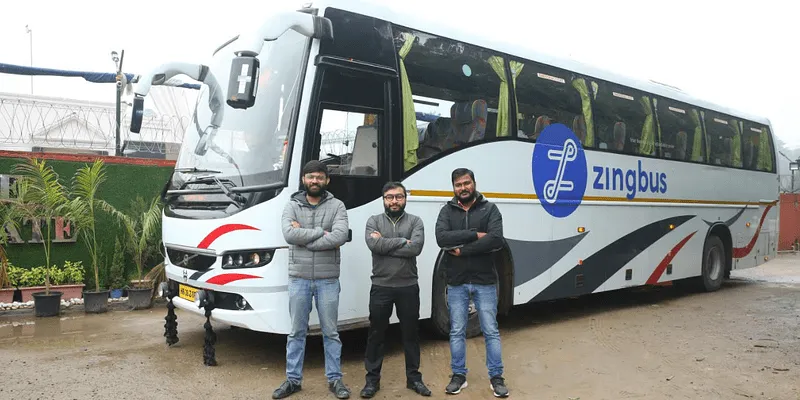This Gurugram-based startup takes the tech route to make intercity bus travel smoother
Intercity bus startup Zingbus runs a technology-enabled fleet of buses and manages all aspects of travel from booking to service experience on one platform.
A Gurugram-based startup aims to make intercity bus travel smoother by managing everything from booking a ticket to ensuring a good service experience and safety standards, all on one platform.
Operating on an online marketplace model, encompasses all aspects of bus travel, says Co-founder and CEO Prashant Kumar. This includes finding the right bus, booking a ticket, providing the boarding and departure times, taking care of the customer experience during the journey, and adhering to safety norms.
Zingbus’ “full-stack technology-enabled” fleet of intercity buses offers a “standardised experience at an affordable price”, says Prashant. For bus operators, the startup aggregates their fleets on one platform and optimises inventory, schedules, and pricing.
In effect, the startup is trying to push online demand, which, according to Prashant, accounts for under 20 percent of all bus bookings at present.

(L-R): Mratunjay, Prashant Kumar and Ravi Kumar Verma
The potential for online demand is immense given that India’s intercity bus travel market is worth $15 billion, according to industry estimates. Further development of road infrastructure is expected to boost growth of intercity mobility services.
“We believe that the right to affordable and dignified travel is fundamental to human existence and development,” says Prashant. “We aspire to provide access to safe, reliable, and affordable travel for everyone.”
The startup was founded in May 2019 by tech graduates Prashant, Ravi Kumar Verma, and Mratunjay, who uses only one name.
Riding on tech and data
The intercity bus aggregator claims to have invested in data platforms that generate customer insights and help design the network of routes dynamically and intelligently.
“The Zingbus model provides a higher number of connections with a smaller number of fleets, comprehensive trip designs, and hub-and-spoke models,” says Prashant. “As this network expands, the customer gets further options and flexibility, which drives direct sales and builds a strong differentiator for an operator looking for a wider network and connections.”
The approach has yielded results, with Zingbus’ daily count of travellers growing 5-10 percent week-on-week since the pandemic, says the co-founder.
The platform also has tools for audits, boarding, and demand management.
“The Zingbus technology allows a much better online experience compared to traditional bus operators,” he says. “Also, it reaches the end customers digitally in a more effective manner.”
At present, the startup clocks over 2,000 journeys daily, connecting more than 100 cities across Delhi-NCR, Himachal Pradesh, Uttar Pradesh, Madhya Pradesh, Uttarakhand, Rajasthan, Gujarat, Maharashtra, Jammu, Haryana, and Punjab. It aims to hit one million journeys in the next one year.
“Since inception we have fulfilled over 250,000 rides,” says Prashant “We recently completed 100 million passenger kilometres.”
The deluxe, air-conditioned fleet consists of Volvo, Scania, and BharatBenz buses that have recliner seats, reading lights, and charging cables on board. Customers can track their trips and itinerary using the Zingbus app, says Prashant.
At present, 80 buses and nine operators are signed up with the aggregator. Another 20 buses with five new operators are scheduled to be launched in the next couple of weeks, he says.
Insights drawn from experience
In shaping Zingbus’ technology and services, the founders and the core team have drawn from their insights and experience working with companies in the travel, ecommerce, logistics, hospitality, and other sectors.
Prashant and Mratunjay used to run intercity bus operations at . Prashant had also worked with in the initial phase of his career. Mratunjay earlier had a stint with . Ravi led technology at intercity taxi firm .
Patna natives Prashant and Ravi were schoolmates. Mratunjay and Prashant were batchmates at IIT Kharagpur, while Ravi is a computer science graduate from IT GGU University. Friends for over a decade now, the three of them founded co-living space provider TipiHomes in 2015, which they sold to OYO in 2016.
Zingbus has 50 employees, of whom 14 are on the technology team.
Business model and funding
Travellers can book a bus ticket on the Zingbus app or its website. First-time users get a reward of 200 Zingcash on signing up. Passengers can also book a Zingbus through , , or more than 1,000 offline sales partners.
The startup has a tier-based revenue-sharing arrangement with bus fleet owners, who operate the vehicles under the Zingbus brand.
Zingbus competes with Yolobus, Intrcity, and Shuttl subsidiary Expresso, among others.
However, Prashant says Zingbus doesn’t have “any out-and-out competition” as its offering and overall experience are “quite unique”.
Last month, the startup raised an undisclosed amount in a pre-Series A round led by Venture Catalysts, Titan Capital, and Better Capital, with participation from Oyo Founder Ritesh Agarwal, People Group Founder Anupam Mittal, 9Unicorns Accelerator Fund, mobility-focused fund AdvantEdge Founders, Smile Internet, MG Group, and several other angel investors.
The aggregator has also secured an undisclosed amount as part of ’s winter 2021 batch of startups in March this year.
Southern sojourn
Of the more than 100 destinations that Zingbus connects with its bus services, 80 are in north India. It has recently started plying to cities and towns in the country’s west, namely in Maharashtra, Gujarat, Madhya Pradesh, and Karnataka.
The startup plans to gradually enter the southern region in the next three months. The South is the biggest market for intercity buses in the country, with Chennai, Bengaluru, and Hyderabad being the most prominent hubs.
Prashant says that in the next three years, Zingbus plans to run 2,500 buses daily connecting the country’s major corridors.
Edited by Lena Saha



![[Funding alert] Zingbus raises pre-Series A round from VCs, angel investors](https://images.yourstory.com/cs/2/a9efa9c0-2dd9-11e9-adc5-2d913c55075e/165-VC-funding1552277843560.jpg?fm=png&auto=format&h=100&w=100&crop=entropy&fit=crop)




